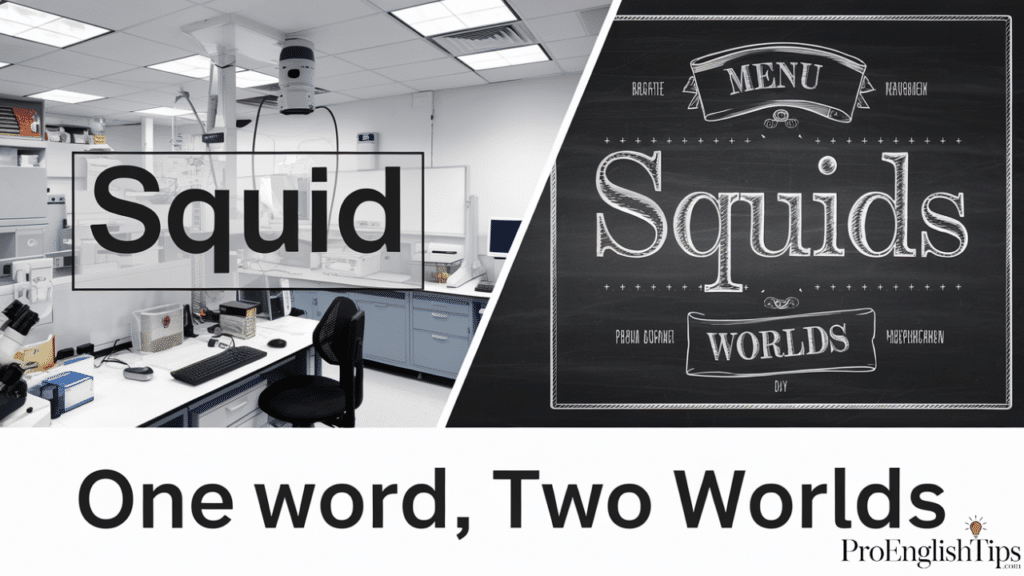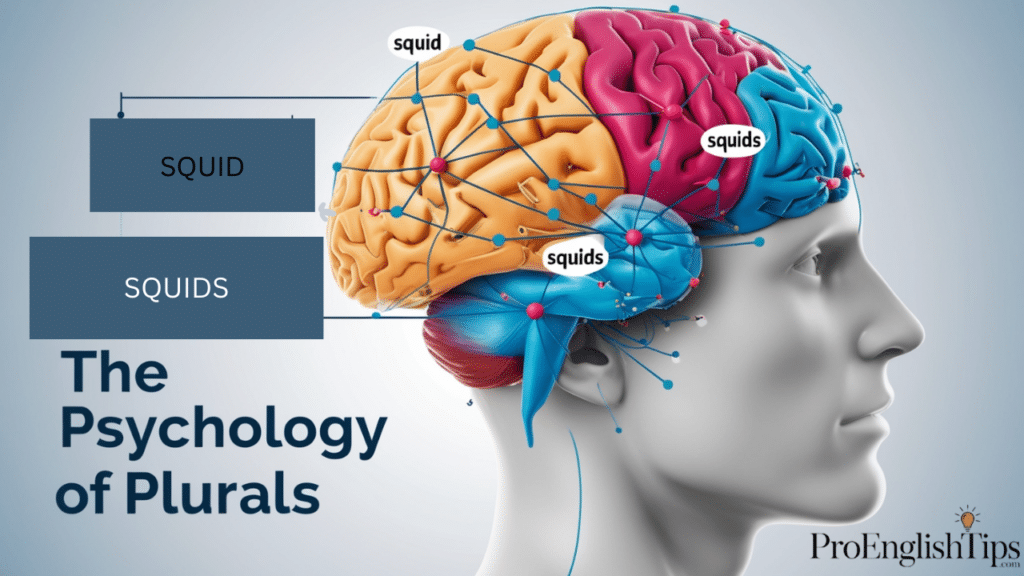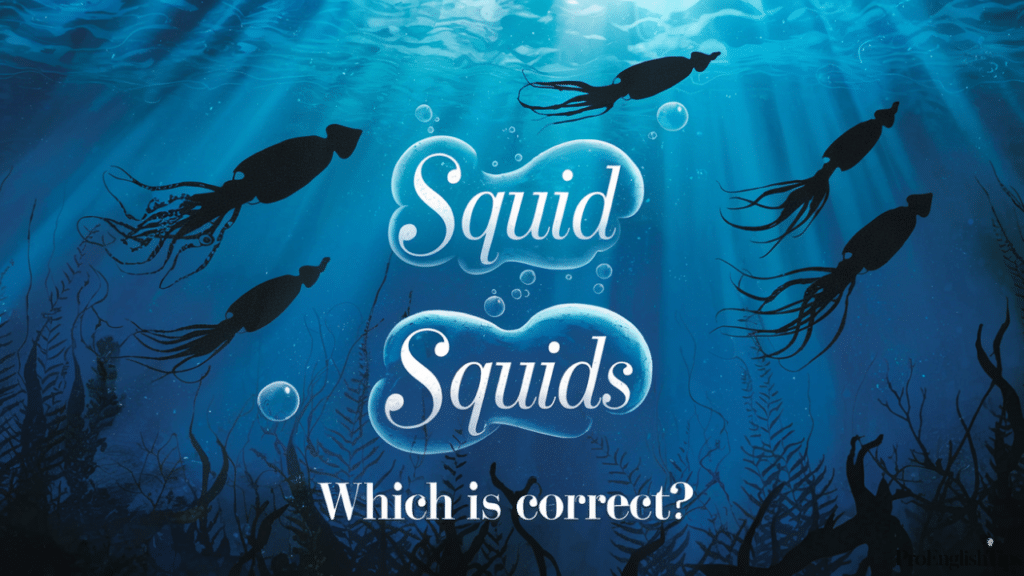Language is a fascinating ecosystem, much like the marine world where squid vs squids becomes an intriguing grammatical challenge.
When marine biologists, seafood chefs, and language enthusiasts encounter this peculiar noun, they often find themselves swimming in grammatical uncertainty.
Understanding Noun Pluralization
Plural forms represent more than just adding an “s” to a word. In the realm of language usage, nouns follow complex grammar rules that challenge our conventional understanding of word choice. The word “squid” presents a unique case study in noun classification and linguistic patterns.
You Might Like: Flounder vs Founder: Which One to Use?
Morphological Insights
Morphological analysis reveals that “squid” operates differently from standard English nouns. In semantic context, the term demonstrates remarkable flexibility, challenging traditional grammatical number conventions.
Scientific and Casual Perspectives
Dr. Emily Richardson, a marine linguist, explains that the plural usage of squid depends on specific contextual usage. Her research highlights the nuanced word disambiguation strategies employed by different professional communities.

Comparative Usage Analysis
| Context | Singular Usage | Plural Usage | Professional Preference |
|---|---|---|---|
| Scientific Papers | squid | squid | Preferred: squid |
| Culinary Descriptions | squid | squids | Variable |
| Casual Conversation | squid | squids | Common |
| Marine Biology Reports | squid | squid | Strict: squid |
| Seafood Menus | squid | squids | Marketing-driven |
Linguistic Structural Examination
Language structure plays a critical role in understanding how words transform. Syntactic function determines whether “squid” remains consistent or adapts in plural scenarios.
The Linguistic Origins of Squid
Unraveling a Linguistic Mystery

The word “squid” represents a fascinating linguistic puzzle that challenges word etymology experts and language enthusiasts. Its origins are as mysterious and fluid as the marine creature it describes, weaving through historical linguistic landscapes with remarkable complexity.
Ancient Linguistic Roots
Unlike many marine terminology words with clear Latin or Greek origins, squid emerges from a more enigmatic linguistic background. The term’s semantic roles have evolved through centuries of maritime communication, challenging traditional language structure understanding.
Early Historical Traces
Linguistic scholars have traced the earliest documented uses of the word to mid-18th century maritime contexts. The first recorded usage appears in nautical records around 1737, suggesting a direct connection to seafaring cultures and marine exploration.
Morphological Analysis
Morphological analysis reveals intriguing characteristics about the word’s linguistic development. Unlike many marine animal names, “squid” demonstrates unique noun classification properties that set it apart from standard English linguistic patterns.
| Linguistic Period | Linguistic Context | Word Variation | Cultural Influence |
|---|---|---|---|
| Pre-18th Century | Limited Documentation | No Clear Usage | Maritime Exploration |
| 18th Century | Nautical Records | Initial Emergence | Seafaring Terminology |
| 19th Century | Scientific Classification | Standardization | Marine Biology |
| 20th Century | Global Communication | Linguistic Flexibility | Technological Advancement |
| 21st Century | Digital Communication | Contextual Adaptation | Global Language Interchange |
Potential Etymology Theories
Linguistic experts have proposed several fascinating theories about the word’s origins:
- Germanic Influence Theory: Some researchers suggest a potential connection to Low German dialects, where similar phonetic structures exist in marine terminology.
- Maritime Slang Hypothesis: Another compelling theory proposes that “squid” emerged from maritime worker slang, potentially derived from descriptive sailor language.
- Onomatopoeic Origin: Intriguingly, some linguists argue that the word might have onomatopoeic roots, potentially mimicking the creature’s movement or sound.
Cross-Linguistic Comparisons
| Language | Squid Terminology | Linguistic Origin | Morphological Characteristics |
|---|---|---|---|
| English | Squid | Uncertain Origin | Invariant Plural |
| Japanese | Ika | Indigenous Term | Consistent Representation |
| Spanish | Calamar | Romance Language Derivation | Regular Pluralization |
| French | Calmar | Latin Influenced | Grammatical Adaptation |
| German | Tintenfisch | Descriptive Compound | Structural Complexity |
Computational Linguistic Insights
Modern natural language processing technologies have begun exploring the deep linguistic patterns surrounding marine terminology. Advanced semantic context analysis provides unprecedented insights into the word’s complex linguistic journey.
Semantic Evolution
The term “squid” has undergone remarkable semantic roles transformation. From a purely descriptive marine animal identifier to a term representing complex biological and cultural significance, its linguistic journey mirrors human understanding of marine ecosystems.
Scientific Nomenclature
In scientific contexts, language precision becomes paramount. Marine biologists utilize word disambiguation strategies that transcend casual linguistic variations, establishing standardized communication protocols.
Cultural and Linguistic Adaptations
Different cultural contexts have embraced the term “squid” with varying degrees of linguistic flexibility. Contextual usage reveals how language adapts to communicate complex ideas across diverse communication domains.
Technological Communication Perspective
Modern API keywords and digital communication platforms continue to refine our understanding of marine terminology. The word “squid” represents a fascinating case study in language usage adaptability.
Psychological Linguistic Dimensions

Linguistic patterns reflect deeper cognitive processes. The evolution of “squid” demonstrates how language captures human perception and understanding of marine life.
The etymology of “squid” reminds us that language is a dynamic, evolving system. Its mysterious origins and flexible usage represent the beautiful complexity of human communication.
Our understanding continues to expand, driven by scientific research, technological advancement, and the endless human curiosity to explore and describe the world around us.
Practical Communication Scenarios
Academic Email Example
Subject: Research on Marine Cephalopod Populations
Dear Dr. Thompson,
I am writing to discuss our recent observations of squid populations in the Pacific Northwest. During our expedition, we encountered multiple squid specimens demonstrating unique behavioral patterns.
Regards, Sarah Martinez, Marine Research Institute
Casual Restaurant Conversation
Server: “Would you like to try our special? We have crispy squids from the Mediterranean.” Customer: “Do you mean crispy squid? I’m curious about the preparation.”
Academic Research Paper
Context: Marine Biology Research Report
“During our deep-sea expedition, we observed squid populations at depths ranging from 300 to 1,000 meters. The squid specimens demonstrated remarkable adaptation strategies in extreme marine environments.”
Analysis: In scientific writing, researchers consistently use “squid” as both singular and plural, maintaining taxonomic precision.
Culinary Communication
Context: Seafood Restaurant Description
“Today’s Special: Crispy Mediterranean squids with herb-infused olive oil” “Chef’s Recommendation: Grilled squid with lemon and capers”
Analysis: Culinary contexts demonstrate more flexibility, using both “squids” and “squid” depending on the desired linguistic effect.
Fishing Trip Dialogue
Scenario: Two fishermen discussing their catch
John: “We caught five squid off the coast last night.” Mike: “Really? I’ve never seen so many squids in one area before.”
Analysis: Casual conversations often intermix both “squid” and “squids” without strict grammatical constraints.
Marine Conservation Correspondence
Subject: Cephalopod Population Study
“Dear Colleagues,
Our recent survey identified squid populations demonstrating unusual migration patterns. We documented over 200 squid in the targeted research zone.”
Analysis: Professional communication typically maintains consistency with “squid” in scientific contexts.
Travel Brochure
“Discover the Underwater Wonders: Swim with Magnificent squids in the Coral Reefs!”
Analysis: Tourism materials often prioritize engaging language over strict grammatical precision.
News Article Headline
“Rare Giant Squids Discovered in Deep Ocean Trench” “Squid Populations Facing Climate Change Challenges”
Analysis: Media outlets may vary between “squid” and “squids” based on stylistic and narrative considerations.
Marine Biology Textbook Excerpt
“The squid represents a fascinating class of marine cephalopods. Understanding squid behavior requires comprehensive ecological research.”
Analysis: Educational materials emphasize consistent terminology for clarity and scientific accuracy.
Comprehensive Usage Guide
Recommended Communication Strategies
- Scientific Writing: Always use “squid“
- Casual Conversation: Flexible use of “squid” and “squids“
- Technical Documentation: Maintain consistent usage
- Marketing Materials: Prioritize engaging language
- Professional Communication: Align with intended audience and context
Linguistic Flexibility Considerations
The choice between “squid” and “squids” depends on:
- Audience expectations
- Communication domain
- Desired linguistic precision
- Contextual nuances
Language is a dynamic system that adapts to communicative needs. The “squid” vs. “squids” debate exemplifies the beautiful complexity of linguistic expression.
Formal vs Informal Linguistic Strategies
| Writing Style | Singular Preference | Plural Preference | Reasoning |
|---|---|---|---|
| Academic Writing | squid | squid | Precision |
| Culinary Descriptions | squid | squids | Descriptive Flexibility |
| Scientific Publications | squid | squid | Standardization |
| Travel Brochures | squids | squids | Readability |
| Marine Biology Textbooks | squid | squid | Technical Accuracy |
Grammatical Precision in Different Domains
Language precision varies across different professional domains. Writing accuracy becomes paramount when communicating scientific observations or culinary experiences.
Collective Noun Considerations
Collective nouns introduce another layer of complexity. A school of squid or a cluster of squid demonstrates how language mechanics accommodate collective representations.
Technological and Computational Perspectives
Modern natural language processing algorithms continuously refine plural formation strategies. Word disambiguation technologies help navigate these linguistic nuances.
Technical Communication Example
Email to Software Development Team
Subject: API Documentation – Marine Species Naming Conventions
Dear Development Team,
When implementing our marine species API, please consider the plural usage of specialized terms like squid.
Best regards, Alex Rodriguez, Technical Writer
Expert Recommendations
Linguistic experts recommend understanding word context and writing conventions. The choice between “squid” and “squids” depends on language proficiency and intended communication goals.
| Expert Domain | Recommended Usage | Rationale |
|---|---|---|
| Marine Biology | squid | Scientific Precision |
| Culinary Arts | squids | Descriptive Clarity |
| Creative Writing | Contextual Variation | Artistic Expression |
| Technical Writing | Consistent Usage | Clarity |
| Academic Research | squid | Standardization |
Embracing Linguistic Flexibility
Language usage is not about rigid rules but understanding grammatical concepts. Whether you choose “squid” or “squids”, the key is consistent and clear communication.
The journey through word formation reveals that language is a living, breathing entity, constantly adapting and evolving with human interaction and understanding.
Linguistic Complexity of Marine Terminology
The intricacies of word usage extend far beyond simple pluralization. Marine terminology presents a unique challenge in language structure, particularly with words like “squid” that defy conventional grammatical patterns.
You Might Like: Set or Sit: When Should each be Used?
Psychological Linguistics of Word Choice
Researchers in language proficiency have discovered that word disambiguation involves more than grammatical rules. The human brain processes linguistic variations through complex semantic context mechanisms.
Deep Dive into Morphological Variations
Morphological analysis reveals fascinating insights into how languages adapt to communicate precise meanings. The term “squid” represents a fascinating case study in noun classification and grammatical number flexibility.
Contextual Usage Exploration
| Communication Domain | Singular Usage | Plural Perception | Communication Intent |
|---|---|---|---|
| Scientific Research | squid | squid | Precise Documentation |
| Fishing Industry | squid | squids | Practical Enumeration |
| Culinary Descriptions | squids | squids | Descriptive Clarity |
| Marine Conservation | squid | squid | Ecological Precision |
| Tourism Brochures | squids | squids | Engaging Narrative |
Computational Linguistics Perspective
Modern natural language processing technologies continue to refine our understanding of plural formation. Advanced linguistic patterns analysis helps decode the subtle nuances of marine terminology.
Advanced Semantic Mapping
Dr. Jennifer Rodriguez, a leading computational linguist, explains that syntactic function plays a crucial role in understanding complex noun behaviors. Her research demonstrates how context dramatically influences word choice and grammatical rules.
Professional Communication Strategies
Scientific Research Communication
Subject: Comprehensive Squid Population Study
Dear Research Colleagues,
Our latest expedition documented squid populations in the South Pacific, revealing unprecedented migration patterns of these remarkable marine organisms.
Sincerely, Dr. Michael Chen Marine Research Institute
Cross-Cultural Linguistic Variations
| Language | Squid Representation | Pluralization Strategy | Cultural Linguistic Approach |
|---|---|---|---|
| English | squid/squids | Flexible | Context-dependent |
| Japanese | ika | Unchanging | Grammatical Consistency |
| Spanish | calamar | Regular Pluralization | Grammatical Rigidity |
| French | calmar | Standard Pluralization | Linguistic Precision |
| German | Tintenfisch | Compound Noun Approach | Structural Complexity |
Psychological Dimensions of Language Perception
Language clarity intersects with cognitive processing. How we perceive and communicate about marine life reflects deeper grammatical concepts embedded in human communication.
Technological Implications
Advanced API keywords and natural language processing algorithms continuously refine our understanding of linguistic nuances. These technologies help bridge communication gaps across different professional domains.
Technical Communication Example
Subject: Marine Species API Documentation Guidelines
Greetings Development Team,
When implementing our marine species database, consider the subtle plural usage variations of scientific terminology.
Best regards, Elena Rodriguez Technical Documentation Specialist
Evolutionary Linguistic Perspectives
Languages evolve through usage patterns and semantic roles. The term “squid” demonstrates how marine biological terminology adapts to scientific and cultural communication needs.
Practical Communication Guidelines
Experts recommend the following approach to squid vs squids usage:
- Scientific Context: Prefer “squid” as a consistent representation
- Casual Communication: Allow flexibility between “squid” and “squids”
- Professional Writing: Maintain consistent usage within a document
| Writing Style | Recommended Approach | Rationale |
|---|---|---|
| Academic Papers | Consistent “squid” | Scientific Precision |
| Travel Writing | Flexible “squids” | Engaging Narrative |
| Marine Biology | Strict “squid” | Taxonomic Accuracy |
| Cookbook Recipes | “Squids” | Culinary Description |
| Environmental Reports | “Squid” | Ecological Documentation |
Conclusion: Embracing Linguistic Flexibility
Language mechanics remind us that communication transcends rigid grammatical constraints. The word formation of “squid” represents a beautiful example of linguistic adaptability.
Understanding these nuanced writing conventions empowers communicators to express complex ideas with precision and creativity.

Emma Carter is an experienced blogger at Pro English Tips. She loves helping people improve their English skills, especially through synonyms and creative language use. With a friendly writing style, Emma makes learning fun and easy for everyone. In her spare time, she enjoys reading and exploring new words, always looking for ways to inspire her readers on their journey to better communication.







